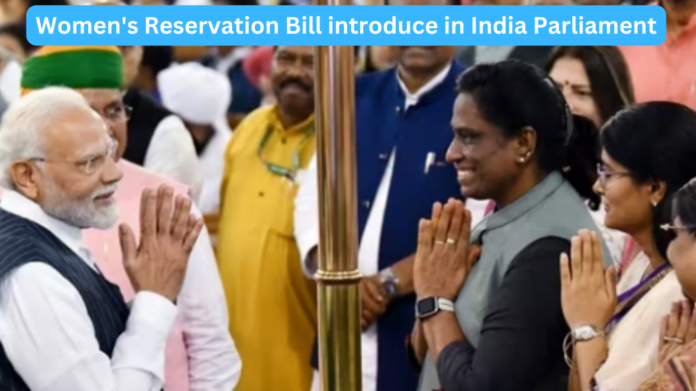Historic Introduction of the Women’s Reservation Bill in Indian Parliament
Prime Minister Modi Calls September 19 a Historic Day
In a momentous event during the ongoing special session of the Indian Parliament. Prime Minister Narendra Modi introduced the Women’s Reservation Bill officially named the Nari Shakti Vandan Adhiniyam. The bill which aims to provide a 33 percent quota for women in both the Lok Sabha and state legislative assemblies.
PM Modi’s Urgent Appeal for Unanimous Support
Prime Minister Modi declared September 19 as a historic day and called upon members of the Opposition to unite in passing this long-pending legislation. The bill which has been stalled for nearly three decades, is seen as a crucial instrument for empowering women in politics.
Empowering Democracy Through ‘Nari Shakti Vandan Adhiniyam’ means Women’s Reservation Bill
Prime Minister Modi emphasized that the ‘Nari Shakti Vandan Adhiniyam’ represents a pivotal constitutional amendment aimed at advancing women led development.
Pledge to Pass the Bill Unanimously
Assuring women across the nation Prime Minister Modi reiterated his government’s commitment to transforming the Women’s Reservation Bill into law. He urged members of Lower house to pass the bill unanimously.He also urge the both house member to pass the bill anamiously
Projected Impact
Law Minister Arjun Ram Meghwal said that, with the proposed amendment, the number of women Members of Parliament (MPs) in the Lok Sabha would rise significantly, from the current 82 to 181. He also said Nari Shakti Vandan Adhiniyam will empower our Government.
Historical Context: A Decades-Long Journey
Congress leader Adhir Ranjan Chowdhury attributed the genesis of the woman quota bill to the efforts of the Congress party. He recalled that previous Congress governments under leaders such as Rajiv Gandhi, PV Narasimha Rao and Manmohan Singh had consistently pursued the bill to provide reservations for women.
Amit Shah Disputes Claim of Bill Lapse
Union Home Minister Amit Shah countered claims that the Women’s Reservation Bill had already lapsed highlighting the complexities surrounding its legislative history.
Key Provisions of the Women’s Reservation Bill
The ‘Constitution (One Hundred and Twenty Eighth Amendment) Bill, 2023’ seeks to introduce three new articles and one new clause in the Constitution. With significant implications for gender representation:
New Clause in 239AA: Seats shall be reserved for women in the Delhi Legislative Assembly. 1/3 of the seats reserved for Scheduled Castes (SCs) shall also be reserved for women. Additionally, 1/3 of the total number of seats filled by direct elections shall be reserved for women as determined by Parliament.
New Article – 330A: Reservation for women in the Lok Sabha, where 1/3 of seats reserved for SCs and STs shall be reserved for women. Furthermore, 1/3 of the total seats filled by direct elections to the Lok Sabha shall be reserved for women.
New Article – 332A: Reserved seats for women in every state Legislative Assembly. 1/3 of seats reserved for SCs and STs shall be designated for women. Additionally, 1/3 of the total seats filled by direct elections to the Legislative Assemblies shall be reserved for women.
New Article – 334A: Reservation shall come into effect after the delimitation is undertaken following the publication of relevant figures from the first census. The rotation of seats for women shall take effect after each subsequent delimitation exercise.
A Long Struggle for Gender Representation
The Women’s Reservation Bill has a complex legislative history dating back to its initial introduction in the Lok Sabha in 1996. The bill was first introduced by Rahul Ganhi in 1980 but it failed and faced resistance and remained unimplemented.
In 1966 the Deve Gowda-led United Front government introduced the Women’s Reservation Bill in the Lok Sabha. But in that it failed because there was no supporter to support this bill. Despite several attempts to pass the bill, it faced challenges and was referred to a joint parliamentary committee before ultimately lapsing. The bill was reintroduced multiple times over many years.
In the time of NDA government led by Atal Bihari Vajpayee also introduce. He made effort in 1998, 1999, 2002 and 2003 but failed there was less supporter and didnot get majority vote.
In 2010, during UPA Government led by Manmohan Singh it was passed success in the Rajya Sabha. However, the bill was never considered in the Lok Sabha. So it lapsed with the dissolution of the 15th Lok Sabha in 2014.






